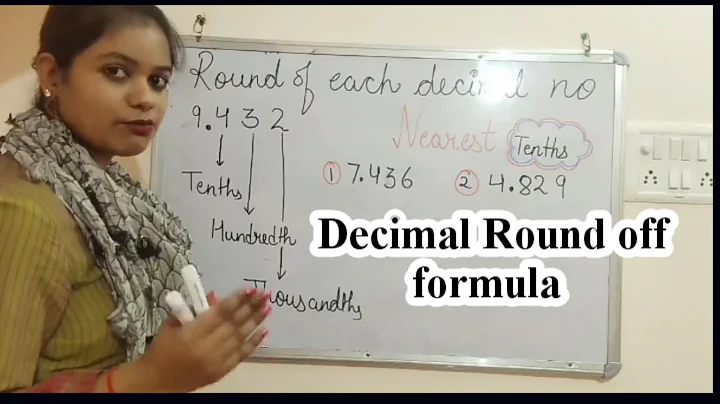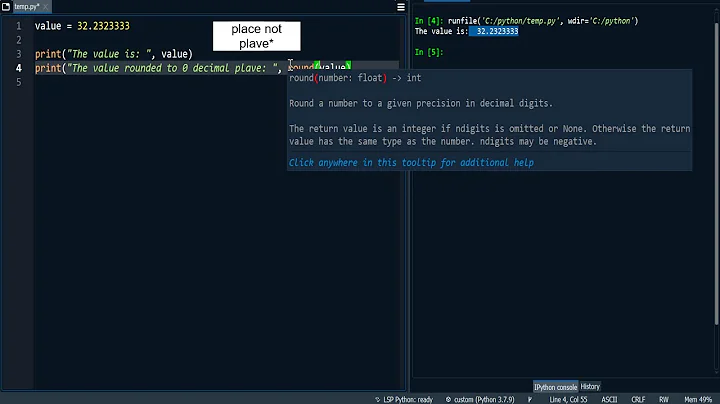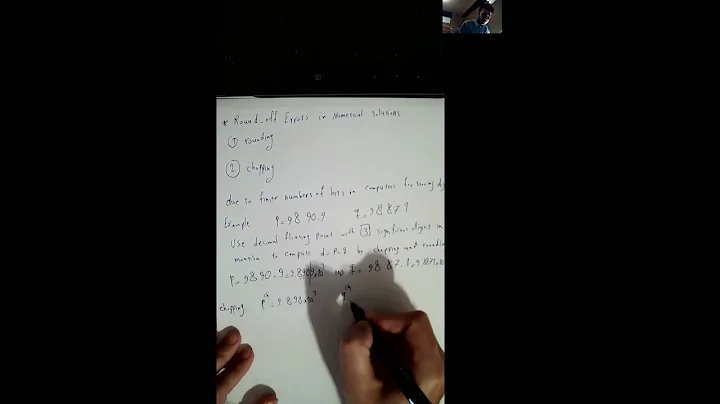Round a ruby float up or down to the nearest 0.05
30,005
Solution 1
Check this link out, I think it's what you need. Ruby rounding
class Float
def round_to(x)
(self * 10**x).round.to_f / 10**x
end
def ceil_to(x)
(self * 10**x).ceil.to_f / 10**x
end
def floor_to(x)
(self * 10**x).floor.to_f / 10**x
end
end
Solution 2
[2.36363636363636, 4.567563, 1.23456646544846, 10.5857447736].map do |x|
(x*20).round / 20.0
end
#=> [2.35, 4.55, 1.25, 10.6]
Solution 3
In general the algorithm for “rounding to the nearest x” is:
round(x / precision)) * precision
Sometimes is better to multiply by 1 / precision because it is an integer (and thus it works a bit faster):
round(x * (1 / precision)) / (1 / precision)
In your case that would be:
round(x * (1 / 0.05)) / (1 / 0.05)
which would evaluate to:
round(x * 20) / 20;
I don’t know any Python, though, so the syntax might not be correct but I’m sure you can figure it out.
Solution 4
less precise, but this method is what most people are googling this page for
(5.65235534).round(2)
#=> 5.65
Solution 5
Here's a general function that rounds by any given step value:
place in lib:
lib/rounding.rb
class Numeric
# round a given number to the nearest step
def round_by(increment)
(self / increment).round * increment
end
end
and the spec:
require 'rounding'
describe 'nearest increment by 0.5' do
{0=>0.0,0.5=>0.5,0.60=>0.5,0.75=>1.0, 1.0=>1.0, 1.25=>1.5, 1.5=>1.5}.each_pair do |val, rounded_val|
it "#{val}.round_by(0.5) ==#{rounded_val}" do val.round_by(0.5).should == rounded_val end
end
end
and usage:
require 'rounding'
2.36363636363636.round_by(0.05)
hth.
Related videos on Youtube
Comments
-
dotty almost 2 years
I'm getting numbers like
2.36363636363636 4.567563 1.234566465448465 10.5857447736How would I get Ruby to round these numbers up (or down) to the nearest 0.05?
-
glenn jackman over 14 yearsYou realize those aren't integers, right?
-
-
Swanand over 14 yearsDarn, you beat be me by a couple of seconds! +1 from me, although I had a slight different version in mind.
-
tvanfosson over 14 yearsNice link. Answer would be better with a summary, though, so it can stand on it's own, especially since the linked code doesn't do exactly what the OP asks, i.e., round to the nearest 0.05, but rounds to a particular decimal place.
-
Irukandji over 14 yearsIn order to get decimals divide by 20.0 -> round(x * 20) / 20.0;
-
Pratik Khadloya about 12 yearsFor ruby:
(7.125 * 20).round / 20.0 => 7.15 -
Rob about 12 yearsAnd worse, b/c the post actually reimplements the built-in ruby function round(number-of-decimal-places), it's a bad idea.
-
Christopher Maujean about 12 yearsThis doesn't round UP to the nearest 0.05 as requested by OP, 2.36.... should be 2.40, not 2.35.
-
sepp2k about 12 years@ChristopherMaujean True, but (despite the title) that's not what the OP asked for. The body of the question says "round these numbers up (or down) to the nearest 0.05". Anyway if you want to round up, use
ceilinstead ofround. -
Christopher Maujean about 12 yearsI've edited the title to reflect the question, if I'm allowed, I'll remove my downvote.
-
 OpenCoderX almost 12 yearsdownvote for only supplying a link, lame... and a link that doesn't even answer the question.
OpenCoderX almost 12 yearsdownvote for only supplying a link, lame... and a link that doesn't even answer the question. -
Aaron Turner about 11 yearsup vote since it does answer the question and round(x) isn't until ruby 0.9.6.
-
Dmitry Lihachev about 11 years5.6355.round(2) != 5.65, but TS wants 5.65
-
 Scott Swezey about 11 yearsThis solution only rounds the number to two decimal places, it does not return a rounded value to the nearest 0.05 as requested.
Scott Swezey about 11 yearsThis solution only rounds the number to two decimal places, it does not return a rounded value to the nearest 0.05 as requested. -
boulder_ruby almost 10 yearsin some ways you're right, I should delete this answer. But on another level this is a very popular question that gets linked to in searches where people find this answer helpful, so I'm going to keep it visible
-
Jerome over 8 yearsthe monkey patching need not be necessary. the technique by multiplying by factor, applying_a_function, then dividing by same factor is what you need. Next quarter-currency_unit? use 4 as the factor and
ciel.to_f... and so on... -
philomory about 7 yearsAs other people have pointed out, this doesn't actually do what the question asks for...
-
jsmartt about 6 yearsThe
ceil_tofunction does not work consistently. For example,0.07.ceil_to(2)returns0.08, but SHOULD be0.07. The same occurs for 0.14, 0.28, 0.55, 1.09, etc.















